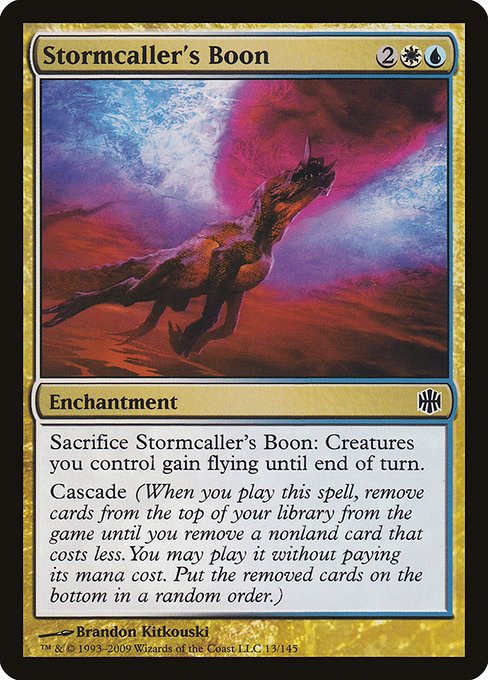Faveur du meneur d'orage
Enchantement
Sacrifiez la Faveur du meneur d'orage : Les créatures que vous contrôlez acquièrent le vol jusqu'à la fin du tour.
Cascade (Quand vous jouez ce sort, retirez de la partie les cartes du dessus de votre bibliothèque jusqu'à ce que vous retiriez une carte non-terrain d'un coût inférieur. Vous pouvez la jouer sans payer son coût de mana. Mettez les cartes retirées au-dessous de la bibliothèque dans un ordre aléatoire.)
Cascade (Quand vous jouez ce sort, retirez de la partie les cartes du dessus de votre bibliothèque jusqu'à ce que vous retiriez une carte non-terrain d'un coût inférieur. Vous pouvez la jouer sans payer son coût de mana. Mettez les cartes retirées au-dessous de la bibliothèque dans un ordre aléatoire.)
standard
future
historic
gladiator
pioneer
explorer
modern
legacy
pauper
vintage
penny
commander
brawl
alchemy
paupercommander
duel
oldschool
premodern
Rulings
After you’re done exiling cards and casting the last one if you chose to do so, the remaining exiled cards are randomly placed on the bottom of your library. Neither you nor any other player is allowed to know the order of those cards.
You exile the cards face-up. All players will be able to see them.
If you cast the last exiled card, you’re casting it as a spell. It can be countered. If that card has cascade, the new spell’s cascade ability will trigger, and you’ll repeat the process for the new spell.
If a spell with cascade is countered, the cascade ability will still resolve normally.
Cascade triggers when you cast the spell, meaning that it resolves before that spell. If you end up casting the exiled card, it will go on the stack above the spell with cascade.
When the cascade ability resolves, you must exile cards. The only optional part of the ability is whether or not you cast the last card exiled.
The converted mana cost of a split card is determined by the combined mana cost of its two halves. If cascade allows you to cast a split card, you may cast either half but not both halves.
You exile the cards face-up. All players will be able to see them.
If you cast the last exiled card, you’re casting it as a spell. It can be countered. If that card has cascade, the new spell’s cascade ability will trigger, and you’ll repeat the process for the new spell.
If a spell with cascade is countered, the cascade ability will still resolve normally.
Cascade triggers when you cast the spell, meaning that it resolves before that spell. If you end up casting the exiled card, it will go on the stack above the spell with cascade.
When the cascade ability resolves, you must exile cards. The only optional part of the ability is whether or not you cast the last card exiled.
The converted mana cost of a split card is determined by the combined mana cost of its two halves. If cascade allows you to cast a split card, you may cast either half but not both halves.
Rulings
After you’re done exiling cards and casting the last one if you chose to do so, the remaining exiled cards are randomly placed on the bottom of your library. Neither you nor any other player is allowed to know the order of those cards.
You exile the cards face-up. All players will be able to see them.
If you cast the last exiled card, you’re casting it as a spell. It can be countered. If that card has cascade, the new spell’s cascade ability will trigger, and you’ll repeat the process for the new spell.
If a spell with cascade is countered, the cascade ability will still resolve normally.
Cascade triggers when you cast the spell, meaning that it resolves before that spell. If you end up casting the exiled card, it will go on the stack above the spell with cascade.
When the cascade ability resolves, you must exile cards. The only optional part of the ability is whether or not you cast the last card exiled.
The converted mana cost of a split card is determined by the combined mana cost of its two halves. If cascade allows you to cast a split card, you may cast either half but not both halves.
You exile the cards face-up. All players will be able to see them.
If you cast the last exiled card, you’re casting it as a spell. It can be countered. If that card has cascade, the new spell’s cascade ability will trigger, and you’ll repeat the process for the new spell.
If a spell with cascade is countered, the cascade ability will still resolve normally.
Cascade triggers when you cast the spell, meaning that it resolves before that spell. If you end up casting the exiled card, it will go on the stack above the spell with cascade.
When the cascade ability resolves, you must exile cards. The only optional part of the ability is whether or not you cast the last card exiled.
The converted mana cost of a split card is determined by the combined mana cost of its two halves. If cascade allows you to cast a split card, you may cast either half but not both halves.
Votre collection ? vos decks ?
Envie de gérer votre collection et/ou créer des decks ?


 0
0
 0.15€
0.15€